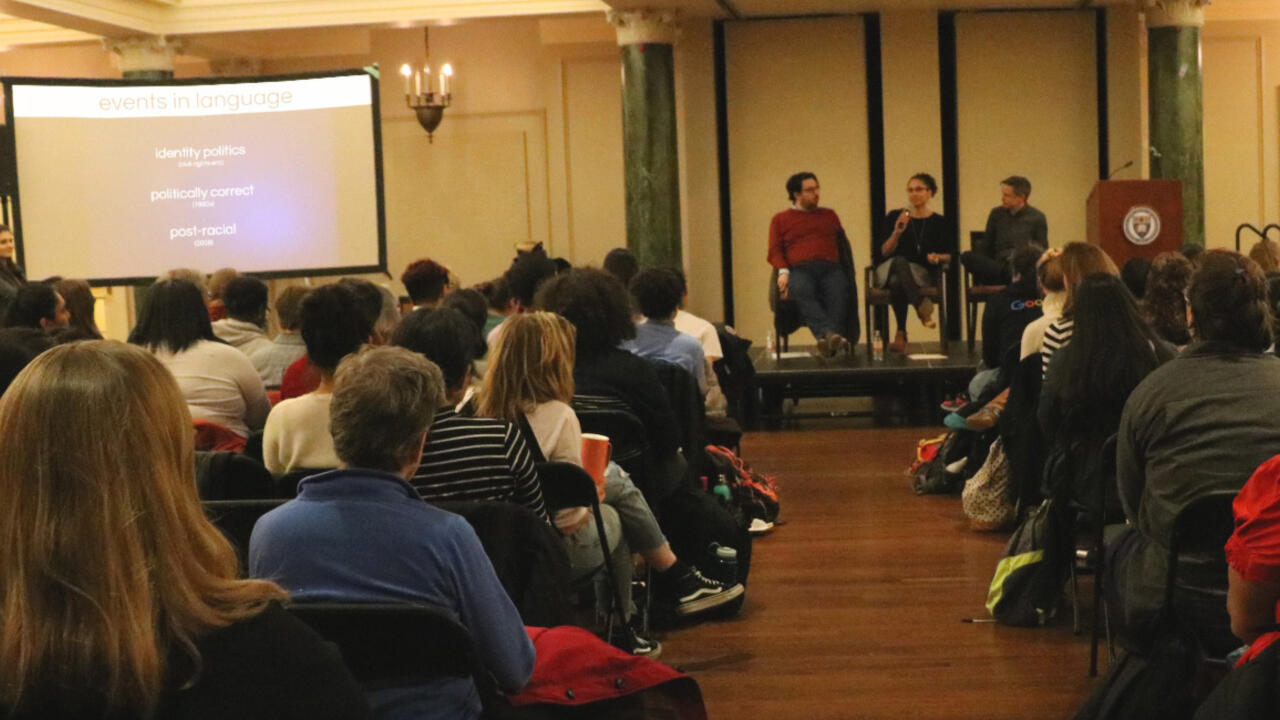Teach-In Examines Race and Resistance in the Age of Trump

While the nation grapples with difficult questions following the presidential election, the Wellesley community continues to engage in conversation about the country’s past, present, and future. On November 28, Wellesley faculty presented a second teach-in to a packed house of students, faculty, and staff on the topic “Race and Resistance in the Age of Trump.” Led by Brenna Greer, Knafel Assistant Professor of the Social Sciences and assistant professor of history, Laura Grattan, associate professor of political science, and Ryan Quintana, assistant professor of history, the teach-in offered insight and analysis related to two questions: How did we get here, and where do we go from here?
Ryan Quintana, a historian of slavery in the United States, said that rather than being shocked by the election results, he was “more surprised at how surprised we were.” He talked about the importance of reckoning with the country’s past, including its history of slavery and displacement of marginalized people. “Part of the reason that we’re so surprised by current events, and why we’re still dealing with so many of the same issues today, has to do with how we deal with our relationship to the past,” Quintana said. “There is so much silence and discomfort; so much that we skip over.”
“You cannot uncouple the simultaneous emergence of democracy, capitalism, liberal individualism, and slavery in the United States. They all emerged at the same time, and we have to reckon with that.” If we can confront our history, he said, “we might start thinking differently about solutions for dealing with issues around social justice.”
Brenna Greer, a historian of race, asked the audience to consider the many factors that contributed to the election results, including the idea of the U.S. president as “leader of the free world”; expansion of consumer culture; income inequality; voting rights rollbacks; and “Obama-inspired white nationalism” and “Trump-inspired white nationalism.” Greer discussed how “a failure to call racism what it is” has been a setback to progress, and she explained the difference between racism and bigotry with a graphic: “Bigotry = racial prejudice + racial animosity. Racism = racial prejudice + institutional power.”
Laura Grattan, a political theorist, suggested that as we think about democracy, it’s important to distinguish between what is legal and what is legitimate. She quoted Martin Luther King, Jr.: “We should never forget, everything that Adolf Hitler did in Germany was ‘legal’ and everything the Hungarian freedom fighters did in Hungary was ‘illegal.’” Grattan added, “It was illegal for a period to give a ride to undocumented day laborers in Arizona and Alabama, just as it may soon be illegal for jails, cities, and college campuses to harbor undocumented immigrants from federal immigration officials.”
Grattan pointed out that “individuals and organized activists who have long refused to comply with racist norms, laws, and institutions” have been the quickest to respond to the kinds of challenges the nation may face in the years ahead. “We should follow suit,” she said.
An hourlong question and answer session followed the presentation. “What resonated so strongly for me were the different ways in which Wellesley students from across all backgrounds are confronting the outcome of the election, from students of color who are facing serious threats, to white students who are struggling with how to talk about these issues with their friends and loved ones back home,” said Katelyn Campbell ’17. “I was also struck by the important questions that students asked about how our current curriculum requirements could do more to meet our needs, in terms of preparing us to address racism in the United States today.”
Quintana, Greer, and Grattan compiled a list of suggested reading materials related to their presentation:
Articles and Online Sources
Walter Johnson, “To Remake the World: Slavery, Racial Capitalism, and Justice”
N. Turkuler Isiksel, “Prepare for Regime Change, Not Policy Change"
Masha Gessen, "Trump: The Choice We Face"
Teju Cole, "A Time for Refusal"
Barnard Center for Research on Women, "The Personal Things" featuring Miss Major Griffin-Gracy
Books
Dan T. Carter, The Politics of Rage
Nikhil Pal Singh, Black is a Country
Matthew D. Lassiter, The Silent Majority
Michelle Alexander, The New Jim Crow
Lizabeth Cohen, A Consumers’ Republic
Mark Engler and Paul Engler, This Is an Uprising



